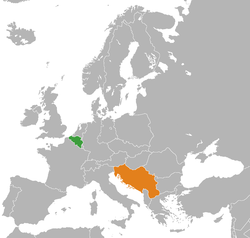Belgium–Yugoslavia relations were historical foreign relations between Belgium and now split-up Yugoslavia (both Kingdom of Yugoslavia or Socialist Federal Republic of Yugoslavia). During the time of Yugoslav existence both countries were European multicultural societies and both implemented federalization reforms in the 1970s with the beginning of the state reform in Belgium and adoption of the 1974 Yugoslav Constitution.
 | |
Belgium |
Yugoslavia |
|---|---|
Following the breakup of Yugoslavia and Yugoslav Wars Belgian judges Chris van den Wyngaert and Guy Delvoie served at the International Criminal Tribunal for the former Yugoslavia.[1] During the Yugoslav crisis Belgium significantly contributed to the United Nations peacekeeping efforts in Eastern Slavonia, multicultural easternmost part of Croatia.
History
editIn the period of decline and dissolution of the Ottoman Empire Belgium established formal bilateral relations with the Kingdom of Serbia, the core predecessor of the Kingdom of Yugoslavia, in 1886.[2]
After the 1948 Tito-Stalin split Belgium realigned its policy and supported Belgrade together with other West Bloc countries. In 1950 Belgian Finance Minister Libaert agreed with American proposed International Bank for Reconstruction and Development credit for Yugoslavia in which Belgium participated with Belgian franc equivalent of 1.8 million dollars.[3] In 1954 two countries signed a convention on issues of social insurance.[4] Relations between the two countries were for some time affected by the Congo Crisis. Following the execution of Patrice Lumumba, Congo's first democratically elected prime minister, demonstrations started in Yugoslav capital Belgrade which escalated in ransacking of the Belgian Embassy.[5]
Minister of Foreign Affairs of Yugoslavia Marko Nikezić visited Belgium in April 1967.[6] Pierre Harmel in return visited Yugoslavia in 1970.[6] Between 6 and 9 October 1970 President of Yugoslavia Josip Broz Tito visited Belgium, where he discussed bilateral relations, trade, Non-aligned conference, European security cooperation and the situation in the Middle East.[7]
In early 1970's Belgium and Yugoslavia signed a set of conventions on extradition and legal assistance (1971), legal assistance in civil and commercial catters (1971), birth certificates and exemption from legalization procedures (1971), recognition and enforcement of court decisions on alimentation (1973).[8][9][10] Belgian Prince Albert visited Yugoslavia together with the Minister of Foreign Trade between 15 and 18 September 1971.[11] In 1980 two countries signed agreement on the avoidance of double taxation.[12]
See also
editReferences
edit- ^ "Former Judges". International Criminal Tribunal for the former Yugoslavia. Retrieved 16 January 2021.
- ^ "Podrška u Izradi Prvih Novčanica i Prvih Industrijskih Pruga". Dipos. Retrieved 16 January 2021.
- ^ "The Ambassador in Belgium (Murphy) to the Secretary of State". Office of the Historian, Foreign Service Institute. Retrieved 16 January 2021.
- ^ "Konvencija o socijalnom osiguranju između Jugoslavije i Belgije" (PDF). Retrieved 16 January 2021.
- ^ Gerard McCann (21 April 2016). "The Sixties and Red Africa: the decade of searching for African utopias". The Conversation. Retrieved 16 January 2021.
- ^ a b Milutin Tomanović 1971, p. 2402.
- ^ Milutin Tomanović 1971, p. 2515.
- ^ "Bilateralni sporazumi u krivičnim stvarima". Ministry of Justice (Serbia). Retrieved 16 January 2021.
- ^ "Bilateralni sporazumi u građanskim stvarima". Ministry of Justice (Serbia). Retrieved 16 January 2021.
- ^ "Bilateralni odnosi: Kraljevina Belgija". Ministry of Public Administration (Croatia). Retrieved 16 January 2021.
- ^ Milutin Tomanović, ed. (1972). Hronika međunarodnih događaja 1971 [The Chronicle of International Events in 1971] (in Serbo-Croatian). Belgrade: Institute of International Politics and Economics. p. 2703.
- ^ "Споразума између Социјалистичке Федеративне Републике Југославије и Краљевине Белгије о избегавању двоструког опорезивања дохотка и имовине" (PDF). Ministry of Finance (Serbia). Retrieved 16 January 2021.
Sources
edit- Milutin Tomanović, ed. (1971). Hronika međunarodnih događaja 1970 [The Chronicle of International Events in 1970] (in Serbo-Croatian). Belgrade: Institute of International Politics and Economics.